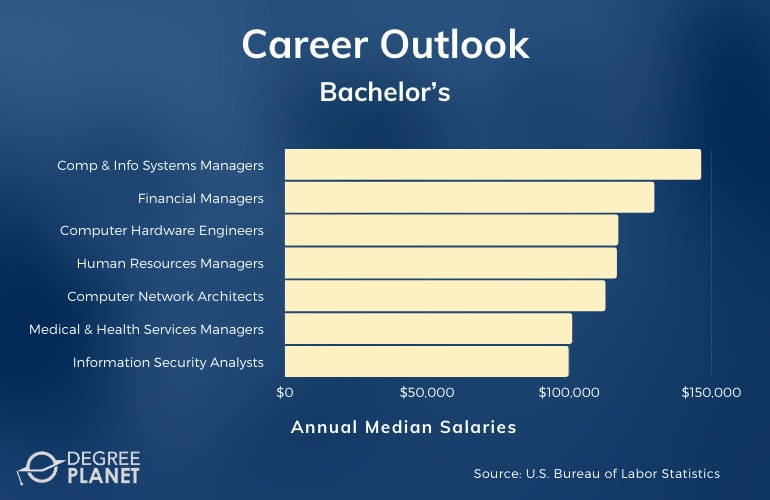Is a bachelor’s degree worth it? Earning a bachelor’s degree often pays off with job opportunities, salary increases, and personal satisfaction.

Editorial Listing ShortCode:
A four year college degree is a minimum requirement for entering many professions, and a bachelor’s degree often qualifies you for jobs with higher-than-average salaries. Plus, getting a bachelor’s degree is an impressive personal accomplishment that you can feel proud of for years to come.
Is a Bachelor’s Degree Worth it?

Yes, a bachelor’s degree is worth it for many students. The Bureau of Labor Statistics is projecting 6% growth in jobs with a bachelor’s degree for entry over the next 10 years.
Common bachelor’s degree careers include information systems manager, financial manager, computer hardware engineer, health services manager, and human resources manager.
A bachelor’s degree can prepare you to work in many different fields. You may select a degree program based on your interests and career goals.
Editorial Listing ShortCode:
The field of computers and technology may be one for you to seriously consider. Jobs in this area are increasing at a rapid rate as tech becomes more integral to business operations and daily life. A bachelors degree could prepare you to work with hardware, software, or networks.
If you’re good with numbers and figures, finance studies could hold promising potential as well. Your knowledge of money and markets could prepare you to assist businesses, nonprofit organizations, governments, or individuals with their finance needs.
You may consider engineering if you have an aptitude for technical topics. The many branches of engineering include civil, computer hardware, electrical, and mechanical.
Many business jobs are also open when you have a bachelors degree. Business disciplines include human resources, sales, and marketing. With experience on your side, you may even move into a high-paying management role.
How to Decide Whether a Bachelor’s Degree Is Right for You

Getting a traditional or online bachelor’s degree requires both time and money, but the benefits of college are worth it for many students.
Before diving headfirst into a program, though, it’s a good idea to consider your goals and how a bachelor’s degree can help you achieve them. Keeping your eyes on the prize will help you persevere all the way to graduation.
1. You know what you want to do with your life.
Most bachelor’s degrees focus on a specific field of study. While you’ll take general education classes, too, it’s the courses centered on your major that will provide you with the most thorough career preparation. For that reason, it’s helpful to have a career goal in mind before you start college.
Your job plans will help you settle on a particular major, so from day one you can select classes that contribute toward that program’s graduation requirements. This way you won’t waste time or money on unnecessary courses.
2. You want to make more money.

As a general rule, more college education means higher pay. Getting a good-paying job often depends on having a college degree.
According to the Bureau of Labor Statistics, people with only high school diplomas make about $39,070 per year on average, compared to people with bachelor’s degrees making $77,920 per year. That’s a potential salary boost of nearly $40,000 a year.
You may also find that you qualify for a salary increase after you have just a few college courses completed. Once you graduate, you’ll increase your employability and may be able to negotiate for higher pay or more robust benefits.
3. Graduate studies are in your future.

Some jobs require advanced training. For example, licensed clinical social workers need a masters in social work, and psychologists need a doctoral degree in their branch of psychology.
If you have your sights set on a job like that, then you’ll need to get the college education to match. Having a bachelor’s degree is a prerequisite for graduate school. During your undergraduate program, you can begin studying foundational concepts that you’ll expand upon later in your schooling.
Editorial Listing ShortCode:
With bachelor’s degrees, you may even be able to start working in your chosen field while attending grad school on the side.
5 Things You Can Do with a Bachelor’s Degree
For nearly every field of work that interests you, you can find a bachelor’s degree program to match. If you’re not quite sure which degree path is right for you, take a look at this list of top careers to see if one catches your eye.
These roles require only a bachelor’s degree, pay respectable salaries, and are experiencing steady job growth.
1. Computer Hardware Engineer

Engineering is a lucrative field, and you need only a bachelor’s degree to get started. One of the highest-paying engineering disciplines is computer hardware engineering.
As a computer hardware engineer, you’d design, build, test, or update computer components to be used in various devices. A bachelor’s degree in computer hardware engineering is just right for this career path. Other degrees to consider include computer science and electrical engineering.
2. Computer or Information Systems Manager

Another option for computer-minded students involves working with tech systems in businesses or other organizations. IT professionals often deal with networks, hardware, software, information security, and databases. Computer managers oversee employees who handle those tasks.
If you have your sights set on this type of job, think about studying computer science or information science. You’ll probably need to gain experience in related jobs before applying for management positions.
3. Financial Manager

Organizations need finance professionals to deal with their money. By preparing reports and analyzing financial data, you can help a business make solid decisions about future hiring, expansion, investments, and cost-saving measures.
A finance degree plus experience could propel you toward a career as a financial manager. Other degrees to consider include economics and accounting. Working as a financial analyst or a loan officer could provide essential experience.
4. Human Resources Manager

If you want to invest in people and work in an organizational setting, human resources can be an excellent career choice. HR will give you the opportunity to help with hiring, training, compensation, and conflict resolution.
For a job as an HR specialist or manager, you may decide to study human resources or business administration. Related jobs to consider include compensation and benefits manager or training and development manager.
5. Medical and Health Services Manager
Healthcare is a growing field, and facilities need administrative professionals to coordinate employees, oversee regulatory compliance, and manage business tasks.
Editorial Listing ShortCode:
Positions are available in hospitals, doctor’s offices, residential facilities, and other healthcare-related organizations. A degree in health management or health administration will equip you with business skills that are specifically tailored to healthcare settings. Before getting a management position, you might work as a medical records technician.
Bachelor’s Degree Alternatives

Having a bachelor’s degree can increase your employability and bump up your salary, but it’s not the right course of action for everybody. For some job paths, there may be a better way to get the training that you’ll need.
- Associate degree: Some jobs in engineering, technology, healthcare, and other fields require only a 2 year degree to get started. Associate credits may later transfer into a bachelor’s program.
- On-the-job training: For some entry-level jobs, you don’t need advanced education. Instead, coworkers and managers will teach you what you need to know for the role.
- Vocational school: Trade school programs focus on essential training for particular career paths, which can help you quickly prepare for a specialized job.
Even though a bachelor’s degree isn’t required for every line of work, you may still want to earn a 4 year degree someday. Your studies may enhance your expertise, give you leverage in the job market, or bring personal satisfaction.
Careers & Salaries

According to the Bureau of Labor Statistics, people with a bachelor’s degree earn an average annual salary of $77,920.
| Careers | Annual Median Salaries |
| Computer and Information Systems Managers | $151,150 |
| Financial Managers | $134,180 |
| Human Resources Managers | $121,220 |
| Computer Hardware Engineers | $119,560 |
| Computer Network Architects | $116,780 |
| Medical and Health Services Managers | $104,280 |
| Information Security Analysts | $103,590 |
| Mechanical Engineers | $90,160 |
| Personal Financial Advisors | $89,330 |
| Financial Examiners | $81,430 |
This chart reflects just a few of the many top-paying careers that you could pursue with a bachelor’s degree. Additional opportunities can be found in healthcare, higher education, community service, media, science, and a variety of other exciting fields.
Is a Bachelor’s Degree Enough?

There are a lot of jobs that you can do with a bachelor’s degree. For example, a bachelor’s could get you ready for a position in business, technology, engineering, social services, higher education, or finance.
Pair your college education with experience, and you may qualify for management positions as well. Education requirements do vary among jobs, though. Some fields, such as mental health counseling, epidemiology, and physical therapy, require graduate degrees.
Editorial Listing ShortCode:
For other careers, while graduate degrees aren’t mandatory prerequisites, some employers will favor candidates with advanced training.
Is a Degree Still Worth It?

Yes, college is an investment, but it can pay off in the long run. While not every job requires a 4 year degree, many do.
For example, if you want to be a teacher, an engineer, or a marketing director, you’re probably going to need a bachelor’s degree before a hiring committee will consider extending a job offer. Keeping your tuition costs low is a strategic way to maximize the value of your degree.
If you qualify, you may be able to build a financial assistance package that includes government grants, scholarships, fellowships, or employer tuition reimbursement.
How Much Money Do You Get with a Bachelor’s Degree?

According to the Bureau of Labor Statistics, people with a bachelor’s degree make an average salary of $77,920 per year.
How much you’ll actually earn with a bachelor’s degree depends on what your major is and what job title you’ll hold. For example, if you get a bachelor’s degree in computer science, you may become a computer network architect, which pays an average of $116,780 each year.
Earning your bachelors in business or finance could help you get started as a personal financial advisor. That job typically pays about $89,330 each year.
Can You Get a Good Job with a Bachelor’s Degree?

Yes, a 4 year degree can provide great preparation for the job market. You should learn foundational skills for your chosen field, and hiring committees often appreciate the training you’ve received.
Based on figures from the Bureau of Labor Statistics, the benefits of a college degree include an average annual salary of $56,590. Plenty of jobs that only require a bachelors even bring in over $80,000 per year. Examples include chemical engineers, actuaries, and sales managers.
A bachelor’s degree may also help you get a job in a growing field, like technology or health services.
What Are the Benefits of a College Degree?

There is economic, educational, and personal value in pursuing a college degree. One of the best college benefits is that a degree can open career doors for you.
Many jobs, especially ones that pay high salaries, require that applicants have at least a bachelor’s degree. On average, people who have earned a college degree make more money than people who haven’t.
Also, getting a bachelor’s can prepare you for a graduate program, which may qualify you for more jobs and higher earnings. If earning a degree has been a long-held goal of yours, it may also feel great to accomplish that dream.
Getting Your Bachelor’s Degree Online

A bachelor’s degree can provide training for interesting jobs and reliable earnings. Once you have a degree, you may be able to negotiate for more responsibilities, higher pay, and better benefits.
Earning a college degree takes time, but there are ways to make it work, even if you’re a busy person. One approach is to take classes online. Many degrees can be achieved through 100% online study. In fact, some universities even offer dual bachelors and masters degree online programs, in which you could take classes toward your undergrad and graduate degrees at the same time.
If you’re ready to reap the benefits of going to college, you may consider taking a look at accredited online programs. Through online study, you can earn a reputable degree and prepare for career success.

